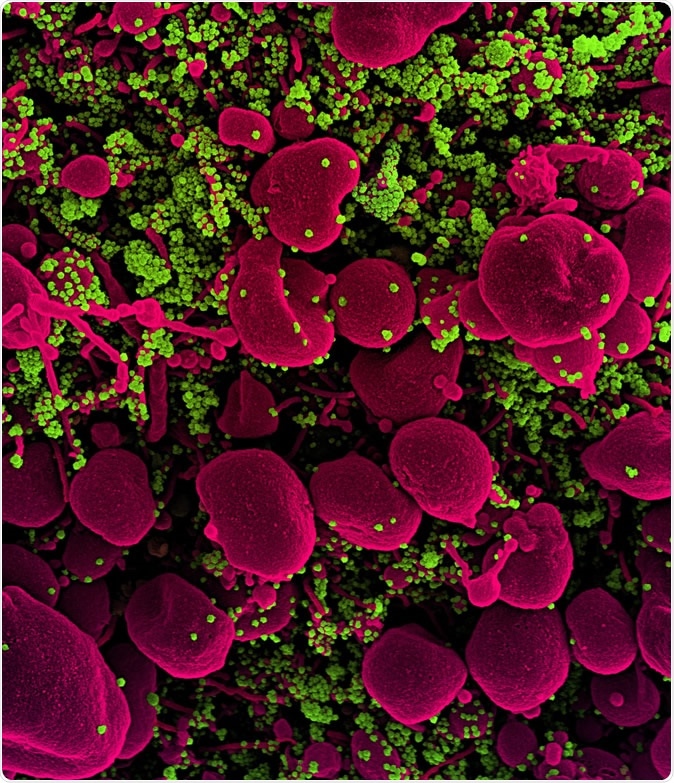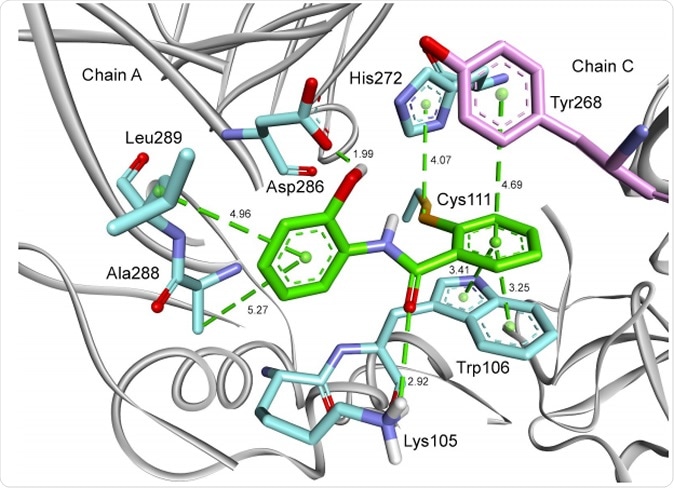A recent paper by researchers from the Netherlands and Poland provides evidence that modified ebselen derivatives may serve as highly promising prospective drugs against coronavirus disease 2019 (COVID-19). The manuscript is freely available on the bioRxiv* preprint server.
In the midst of COVID-19 pandemic, caused by the severe acute respiratory syndrome coronavirus 2 (SARS-CoV-2), the world waits for any sign of hope in countering the disease. This can only be done by repurposing or developing effective drugs or vaccines.
Research unfolding at an unprecedented pace recently unveiled potential targets: cysteine proteases that play a significant part in the viral replication process. These structures can be actively used to search for compounds that block their action, and in turn, exert sufficient antiviral activity.

Novel Coronavirus SARS-CoV-2 Colorized scanning electron micrograph of an apoptotic cell (pink) heavily infected with SARS-COV-2 virus particles (green), isolated from a patient sample. Image captured at the NIAID Integrated Research Facility (IRF) in Fort Detrick, Maryland. Credit: NIAID

 This news article was a review of a preliminary scientific report that had not undergone peer-review at the time of publication. Since its initial publication, the scientific report has now been peer reviewed and accepted for publication in a Scientific Journal. Links to the preliminary and peer-reviewed reports are available in the Sources section at the bottom of this article. View Sources
This news article was a review of a preliminary scientific report that had not undergone peer-review at the time of publication. Since its initial publication, the scientific report has now been peer reviewed and accepted for publication in a Scientific Journal. Links to the preliminary and peer-reviewed reports are available in the Sources section at the bottom of this article. View Sources
SARS-CoV-2 proteases and seleno-organic molecules
Two proteases may serve as a target for drugs: main or chymotrypsin-like protease (Mpro) responsible for polypeptide processing during viral replication, and papain-like protease (PLpro) that – alongside aiding in viral replication – assembles new virus particles within human cells.
PLpro from newly discovered SARS-CoV-2 is supposedly the essential viral enzyme that incapacitates the antiviral immune response and takes advantage of the host's immune system. Hence, the current understanding of the SARS-CoV-2 infectious process indicates that shutting off PLpro represents a viable strategy in halting the spread of the virus.
Some recent research endeavors pinpointed peptide analogs and ebselen (a synthetic seleno-organic molecule) as highly active inhibitors for PLpro. Ebselen is known for its cytoprotective, anti-inflammatory, and anti-atherosclerotic traits, also displaying a low toxicity profile. Furthermore, the compound was proved to be effective in hepatitis C and various malignancies.
This is why researchers from the University of Amsterdam and Vrije Universiteit Amsterdam in the Netherlands, as well as Wroclaw University of Science and Technology in Poland, aimed to appraise the inhibitory properties of twelve ebselen derivatives against the original SARS virus (SARS-CoV-1) PLpro (PLproSARS) and SARS-CoV-2 PLpro (PLproCoV2).

A model of the complex of compound 1d with SARS-CoV-2 PLpro
Pharmaceutical chemistry at its best
A total of twelve organoselenium compounds, i.e., structural analogs of antioxidant drug ebselen, were screened for their capacity to inhibit the aforementioned papain-like protease (PLpro) from the SARS-CoV-2.
For the enzymes assay, spectrofluorimetry (a highly sensitive analytical method that detects fluorescent compounds at the level of nanograms) was used to measure reactions in 96-well plate format using two wavelengths: excitation at 355 nanometers and emission at 460 nanometers.
For the inhibition assay, the inhibitor was screened against recombinant PLproSARS and PLproCoV2 at 37°C in the assay buffer. A total of eight different inhibitor concentrations were used, while 50% inhibition value (IC50) was taken from the dependence of the hydrolysis velocity on the logarithm of the inhibitor concentration.
Finally, molecular modeling studies were performed using the Discovery Studio 2020 (software utilized for predictions, modeling, and simulation in life sciences). The crystal structure of the SARS-CoV-2 was taken as the starting point for calculating the enzyme complexed with ebselen.
In pursuit of blockbuster derivatives
In this study, the researchers identified four potent inhibitors that show favorable binding properties towards PLpro of SARS-CoV-2. Akin to recently published articles on ebselen, the mode of action was shown to be irreversible.
Interestingly, most of the derivatives completely blocked PLproCoV2 at a high concentration of the inhibitor (20 micromoles); conversely, only five of them inhibited PLproSARS, while the rest of them failed.
"In conclusion, we identified very effective inhibitors of PLproCoV2, with the IC50 constants in the nanomolar range", explain study authors in their paper available on the bioRxiv preprint server.
"Our findings provide evidence that ebselen derivatives with an additional hydroxy or methoxy group serve as highly potential prospective drugs against COVID-19", they conclude.
In any case, the activity of the PLproCoV2 is pivotal for the progression of COVID-19; therefore, it can be perceived as a key target for the development of anti-SARS-CoV-2 drugs that may actually enter the drug pipeline in the near future.

 This news article was a review of a preliminary scientific report that had not undergone peer-review at the time of publication. Since its initial publication, the scientific report has now been peer reviewed and accepted for publication in a Scientific Journal. Links to the preliminary and peer-reviewed reports are available in the Sources section at the bottom of this article. View Sources
This news article was a review of a preliminary scientific report that had not undergone peer-review at the time of publication. Since its initial publication, the scientific report has now been peer reviewed and accepted for publication in a Scientific Journal. Links to the preliminary and peer-reviewed reports are available in the Sources section at the bottom of this article. View Sources